 |

|

|
|
|
An up close and personal interview with U.S. Marine Corps Veteran and Togetherweserved.com Member:
CWO3 William B. Martin U.S. Marine Corps (Ret) (1973-1997)
PLEASE DESCRIBE WHO OR WHAT INFLUENCED YOUR DECISION TO JOIN THE MARINE CORPS?
My brothers and I constantly played "Army" from the time I was 4 years-old until it became too embarrassing for us to indulge in kid's games. Nevertheless, I always possessed an inclination to enlist as soon as I was old enough.
I became focused on the Marine Corps the first time I saw the movie "The D.I." starring Jack Webb. I saw this movie sometime during my grammar school years and the sense of challenge and Esprit de corps it represented stuck with me all the way through high school. I also was intrigued by the 1970's recruiting poster which showed a short D.I. getting in the face of a tall recruit with the caption "We Don't Promise You a Rose Garden!" time I saw the movie "The D.I." starring Jack Webb. I saw this movie sometime during my grammar school years and the sense of challenge and Esprit de corps it represented stuck with me all the way through high school. I also was intrigued by the 1970's recruiting poster which showed a short D.I. getting in the face of a tall recruit with the caption "We Don't Promise You a Rose Garden!"
Looking back on my high school years I realize that absolutely no one encouraged me to pursue enlistment in the Marines, much less offering guidance on what to expect during boot camp or what career path I should follow. I think that probably explains my unpreparedness when I visited the recruiter for the first time within a few weeks of completing high school.
Upon entering the hallway leading to the recruiting offices of all the service branches, I was immediately met by a very charismatic gunnery sergeant who was probably the first adult to ever actually listen to me speak without interjecting a dismissive or sarcastic remark. After the initial interview and scoring very well on the in-office aptitude test, he asked me what I wanted to do in the Marines. Looking back at that moment I wish  I would have stuck with my original plan which was to be a tank crewman, but I just told him that I wanted "to be in a combat unit and go overseas." Within the space of one week he had me ASVAB tested, physically examined, and signed to a three year open contract. By the end of Nov 1973, I was a newly trained 0311 en-route to my first overseas assignment. I would have stuck with my original plan which was to be a tank crewman, but I just told him that I wanted "to be in a combat unit and go overseas." Within the space of one week he had me ASVAB tested, physically examined, and signed to a three year open contract. By the end of Nov 1973, I was a newly trained 0311 en-route to my first overseas assignment.
There were a couple of guys in my senior class who talked about enlisting with me on the buddy system, but when it came to time to go see the recruiter neither of them were anywhere around. They both went down the same path that everyone from my senior class followed which was go to college or find some go-nowhere job in our hometown. I met one on them about 2 1/2 years after high school graduation when I was a corporal with two active duty assignments under my belt and en-route to MSG School. He was a junior in college and his girlfriend's hands were tightly clamped around his arm the entire time we were eating lunch at a fast-food joint. I told him all the exciting things I had been doing, where I had been stationed, and what I expected to happen once I went on MSG duty. He sat there grinning like an excited crazy person, but his girlfriend altern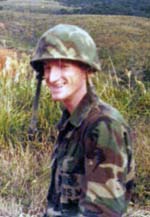 ated between looking at him with concern over their future plans and staring daggers at me for putting ideas into his head. I don't know if they were engaged, but it was obvious that this girl intended to tie-the-knot with him, and all my stories of overseas adventure and challenging assignments were probably tempting him to chuck everything and go see the recruiter. However, if she had deigned to say anything to me, I could have reassured her that her beau was easily excited by the allure of military service, but that it would end there. He was the kind of guy who talked about doing something daring, but when it came to taking bold action he could be counted upon to follow the safe, comfortable path in life. I'm sure he graduated from college, married that girl or someone like her, landed a middle class job, raised some kids, and is close to retiring as a grandpa, just like most of my high school peers. ated between looking at him with concern over their future plans and staring daggers at me for putting ideas into his head. I don't know if they were engaged, but it was obvious that this girl intended to tie-the-knot with him, and all my stories of overseas adventure and challenging assignments were probably tempting him to chuck everything and go see the recruiter. However, if she had deigned to say anything to me, I could have reassured her that her beau was easily excited by the allure of military service, but that it would end there. He was the kind of guy who talked about doing something daring, but when it came to taking bold action he could be counted upon to follow the safe, comfortable path in life. I'm sure he graduated from college, married that girl or someone like her, landed a middle class job, raised some kids, and is close to retiring as a grandpa, just like most of my high school peers.
I'm so happy I followed the route in life that I chose out of high school. There were a few things I would have done differently, such as going to see the recruiter at the beginning of my junior year and signing up for MOS 1811, but overall it was the right choice for me. I'm also pretty certain that I'm the only guy from my senior class who enlisted. I never saw anyone from my high school while processing at MEPS nor did I meet any of them during all of my decades of active and reserve service.
WHETHER YOU WERE IN THE SERVICE FOR SEVERAL YEARS OR AS A CAREER, PLEASE DESCRIBE THE DIRECTION OR PATH YOU TOOK. WHAT WAS YOUR REASON FOR LEAVING?
I started out as a grunt with the intention of only staying in the Corps for a few years and seeing as much of the world as possible. However, at the 2 1/2 year mark of my first enlistment contract I realized I had only been to one country and I certainly intended to have a lot more adventure and travel. Plus I had terrible grades in high school, so college was not an option or desire at that point in my life. There was also the fact that I did not have any marketable skills for civilian employment, and that my pay and benefits as a Cpl were far better than what I could get at a minimum wage, entry level job in the private sector. So I reenlisted for 4 years with a guarantee of MSG duty and promotion to Sgt upon completion of 3 years of active duty. I certainly intended to have a lot more adventure and travel. Plus I had terrible grades in high school, so college was not an option or desire at that point in my life. There was also the fact that I did not have any marketable skills for civilian employment, and that my pay and benefits as a Cpl were far better than what I could get at a minimum wage, entry level job in the private sector. So I reenlisted for 4 years with a guarantee of MSG duty and promotion to Sgt upon completion of 3 years of active duty.
After three successful embassy assignments I came back to the States and reenlisted again for a lateral move to the intel field as an 0231 (intel analyst). It took about 7 years for me to earn promotion to SSgt, but a couple of years after that I was selected for promotion to Warrant Officer with MOS 0205 (tactical intel officer).
Although most of my assignments were stressful, aggravating, and sometimes downright crappy, I thoroughly enjoyed the challenges of the intel field, the opportunities for traveling to foreign countries that I would have never been able to see as a civilian, and the satisfaction of leading Marines as a grunt squad leader, MSG det ANCOIC, HQ platoon Sgt, S-2 section chief, or watch team OIC.
It was an adventurous career and that is exactly what I expected when I first went to see the Marine recruiter. However, I often wonder how things would have turned out if I had told the recruiter that I wanted to be a tanker.
IF YOU PARTICIPATED IN COMBAT, PEACEKEEPING OR HUMANITARIAN OPERATIONS, PLEASE DESCRIBE THOSE WHICH WERE THE MOST SIGNIFICANT TO YOU AND, IF LIFE-CHANGING, IN WHAT WAY.
The only humanitarian operation I participated in was "New Arrivals" from Aug-Sep 1975 when 1/5 was tasked with providing roving security patrols for the 50,000 Southeast Asian refugees living in a 10-square-mile community of tents and huts at the northern end of Camp Pendleton where the refugees would spend a few weeks, or even months, as church groups and other organizations looked for jobs and permanent homes for them. Their evacuation from Vietnam was called Operation Frequent Wind which was the final phase in the evacuation of American civilians and "at-risk" Vietnamese from Saigon, South Vietnam prior to the takeover of the city by the North Vietnamese Army in the Fall of Saigon. few weeks, or even months, as church groups and other organizations looked for jobs and permanent homes for them. Their evacuation from Vietnam was called Operation Frequent Wind which was the final phase in the evacuation of American civilians and "at-risk" Vietnamese from Saigon, South Vietnam prior to the takeover of the city by the North Vietnamese Army in the Fall of Saigon.
Our battalion was still in the process of re-forming after being in a cadre status for almost a year, so it was a good chance for everyone to form some unit cohesion with a low-level operational assignment. This was particularly true for C Co since we had only begun to be reconstituted in July 1975.
The refugees were billeted in tent cities, except for the orphans who were living in air conditioned trailers. We conducted two-man walking patrols around each tent cluster containing probably about one or two thousand refugees. Our only equipment were helmet liners that were painted gold with "MP" in red letters, plus a PRC-25 for comm with the COG. We were not issued any weapons, and our primary purpose was to exert our reputation as Marines to ensure good order and discipline among the refugees and keep contraband smugglers from sneaking into our assigned patrol area. Except for continually walking around in shifts of six hours, it was rather enjoyable duty.
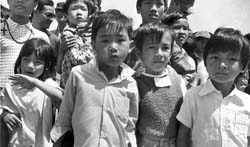 The little Vietnamese kids loved to tag along with us and practice their English lessons. We pulled one week of guard duty at the refugee camp and then one week of garrison duty back at Camp Margarita. About the middle of Sep most of 1/5 had been reformed and we began "lock-on" training to become combat certified as a deployable infantry unit. That was also the time frame in which the refugee camp was closed down since most of the Vietnamese had been resettled in the U.S. The little Vietnamese kids loved to tag along with us and practice their English lessons. We pulled one week of guard duty at the refugee camp and then one week of garrison duty back at Camp Margarita. About the middle of Sep most of 1/5 had been reformed and we began "lock-on" training to become combat certified as a deployable infantry unit. That was also the time frame in which the refugee camp was closed down since most of the Vietnamese had been resettled in the U.S.
I participated in only one contingency operation during my service in the Marine Corps. It occurred during the spring of 1988 when I deployed to Panama as part of the Forward Command Post for 6th MEB. Everyone fully expected implementation of the contingency plan for Panama since the Panamanian leader, General Manual Noriega, was blatantly violating portions of the Panama Canal Treaty. However, within two weeks of our arrival, the Commander for SOUTHCOM convened a meeting with our Forward CP and the Forward CP for the 101st Airborne to inform us that he felt that the 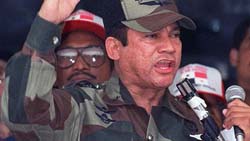 National Command Authority (NCA) had an inaccurate perception of the security situation in Panama and that it was premature to deploy any Marines and Army Airborne into his Theater. He also told us that he was going to recommend to the NCA that further implementation of the contingency plan should be suspended. However, since 6th MEB and the 101st Airborne already had deployed their Forward CPs to Panama, the SOUTHCOM Commander decided we could stay in his Theater and be re-designated as COMMARFOR - Panama and COMARFOR - Panama respectively. He thought this arrangement would allow us to continue our liaison and coordination with our SOUTHCOM counterparts for contingency planning purposes while making it possible for him to calm down the tensions between Washington and Noriega. Consequently, I spent almost four months in Panama preparing for the contingency operation that eventually toppled Noriega about 1 1/2 years later. National Command Authority (NCA) had an inaccurate perception of the security situation in Panama and that it was premature to deploy any Marines and Army Airborne into his Theater. He also told us that he was going to recommend to the NCA that further implementation of the contingency plan should be suspended. However, since 6th MEB and the 101st Airborne already had deployed their Forward CPs to Panama, the SOUTHCOM Commander decided we could stay in his Theater and be re-designated as COMMARFOR - Panama and COMARFOR - Panama respectively. He thought this arrangement would allow us to continue our liaison and coordination with our SOUTHCOM counterparts for contingency planning purposes while making it possible for him to calm down the tensions between Washington and Noriega. Consequently, I spent almost four months in Panama preparing for the contingency operation that eventually toppled Noriega about 1 1/2 years later.
During the last two weeks of my Panama deployment, I was unarmed and couriering a large amount of classified material from ARSOUTHCOM to our HQ on Rodman NB with three other Marines in a HMMUV.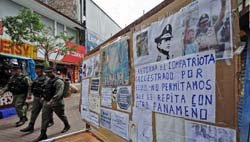 Undercover Panamanian police pulled over our HMMUV for a "traffic violation" and ordered us to follow them to the PDF HQ where we would have been searched and detained. I told our driver to follow the cops only as long as they were headed in the direction of Rodman, and that when they turned off on a different route, he was to go as fast as necessary to get us back to Rodman Naval Base, even if he had to break a bunch of traffic laws. Undercover Panamanian police pulled over our HMMUV for a "traffic violation" and ordered us to follow them to the PDF HQ where we would have been searched and detained. I told our driver to follow the cops only as long as they were headed in the direction of Rodman, and that when they turned off on a different route, he was to go as fast as necessary to get us back to Rodman Naval Base, even if he had to break a bunch of traffic laws.
Once we veered off, the Panamanian cops chased us through the north part of Panama City and across the Panama Canal Bridge which happens to be one mile long. The cops managed to cut us off on the north side of the bridge and blocked our escape with their unmarked car. However, they both made the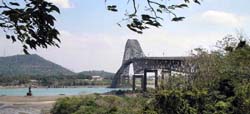 mistake of getting out of their vehicle at the same time. While we argued with the cops, the opposing lane of traffic eased up and our driver took off again and we made it to the main gate of Rodman before the cops could catch us again. It would have been a huge international incident if the Panamanians have found out that I was couriering several intel studies and major portions of the OPLAN regarding the contingency planning for Panama's invasion. Fortunately for the four of us in the HMMUV, the Panamanians were just puzzled as to why we were so determined to not be detained. Due to this near disastrous incident, COMMARFOR authorized us to carry our M9 pistols whenever transporting classified material off base, as long as we kept them concealed under our jackets. mistake of getting out of their vehicle at the same time. While we argued with the cops, the opposing lane of traffic eased up and our driver took off again and we made it to the main gate of Rodman before the cops could catch us again. It would have been a huge international incident if the Panamanians have found out that I was couriering several intel studies and major portions of the OPLAN regarding the contingency planning for Panama's invasion. Fortunately for the four of us in the HMMUV, the Panamanians were just puzzled as to why we were so determined to not be detained. Due to this near disastrous incident, COMMARFOR authorized us to carry our M9 pistols whenever transporting classified material off base, as long as we kept them concealed under our jackets.
OF ALL YOUR DUTY STATIONS OR ASSIGNMENTS, WHICH ONE DO YOU HAVE FONDEST MEMORIES OF AND WHY? WHICH ONE WAS YOUR LEAST FAVORITE?
 My favorite assignment was as the intel chief for VMFA-531 (Grey Ghosts), MAG-11, MCAS El Toro, CA. It was a great squadron with high morale and pride in keeping our aircraft flying. I spent two years with this unit before I was dragged away for recruiting duty. It was the only unit during my Marine Corps career that I would have gladly stayed with for several years. Unfortunately, this unit was deactivated during the mid- 90's. My favorite assignment was as the intel chief for VMFA-531 (Grey Ghosts), MAG-11, MCAS El Toro, CA. It was a great squadron with high morale and pride in keeping our aircraft flying. I spent two years with this unit before I was dragged away for recruiting duty. It was the only unit during my Marine Corps career that I would have gladly stayed with for several years. Unfortunately, this unit was deactivated during the mid- 90's.
My worst assignment is a tie between Marine Barracks, Roosevelt Roads NAS, PR and recruiting duty in Santa Rosa, CA. Both assignments were distinguished by long work hours, low morale, and very poor leadership.
FROM YOUR ENTIRE SERVICE, INCLUDING COMBAT, DESCRIBE THE PERSONAL MEMORIES WHICH HAVE IMPACTED YOU MOST?
 My assignment as an infantry squad leader showed me that I possessed the ability to be a leader of Marines. All I had to do was put forth a sincere effort and emulate as best I could the Marine Corps' principles and character traits for leadership. It was an extremely stressful position for me since I was only 20 years old at the time and I had some guys in my squad who were much older and more experienced than me. However, they all recognized that I was trying to do a good job and they cooperated as much as their individual personality quirks allowed them. The experience quickly matured me and taught me how to exercise a combination of patience, fairness, and resolute firmness of command. My assignment as an infantry squad leader showed me that I possessed the ability to be a leader of Marines. All I had to do was put forth a sincere effort and emulate as best I could the Marine Corps' principles and character traits for leadership. It was an extremely stressful position for me since I was only 20 years old at the time and I had some guys in my squad who were much older and more experienced than me. However, they all recognized that I was trying to do a good job and they cooperated as much as their individual personality quirks allowed them. The experience quickly matured me and taught me how to exercise a combination of patience, fairness, and resolute firmness of command.
These acquired leadership traits have served me well in my military careers in the Marines and Army, plus my civilian employment endeavors.
OF ALL THE MEDALS, AWARDS, QUALIFICATION BADGES OR DEVICES YOU RECEIVED, PLEASE DESCRIBE THE ONE(S) MOST MEANINGFUL TO YOU AND WHY?
 I was not awarded any medals of great distinction during my service in the Marines. However, I was always quite pleased with my rifle and pistol expert qualification badges. I qualified six times as a rifle expert while firing either the M14, M16A1, or M16A2. The range coaches at Edson Range taught us recruits how to fire a rifle very well. Additionally, I qualified 3 times as a pistol expert while firing the M1911A1 and the M9 pistols. I was not awarded any medals of great distinction during my service in the Marines. However, I was always quite pleased with my rifle and pistol expert qualification badges. I qualified six times as a rifle expert while firing either the M14, M16A1, or M16A2. The range coaches at Edson Range taught us recruits how to fire a rifle very well. Additionally, I qualified 3 times as a pistol expert while firing the M1911A1 and the M9 pistols.
Photo is me and Cpl Tom Gaither on Okinawa eating lunch at Camp Schwab's machine gun range in 1983. He had just told me that he was in the 7th grade when I was promoted to Sgt.
WHICH INDIVIDUAL(S) FROM YOUR TIME IN THE MILITARY STAND OUT AS HAVING THE MOST POSITIVE IMPACT ON YOU AND WHY?
I can't think of a single individual who I would describe as having a noticeably positive impact on me during my military service. Of course, I've known many people who were good leaders and trustworthy persons, but none of them ever exhibited the qualities of leadership that you would expect of someone who you would unquestionably follow into combat or hope to emulate in your life.

I have certainly never been associated with someone who I would describe as a "mentor." At best, the Marines I served with had leadership skills that were sufficient for the position that they held, but I never knew anyone that I would call "inspiring." In fact, the higher up in rank I advanced, the more opportunity I had to observe the unflattering aspects of my seniors' personalities.
CAN YOU RECOUNT A PARTICULAR INCIDENT FROM YOUR SERVICE WHICH MAY OR MAY NOT HAVE BEEN FUNNY AT THE TIME, BUT STILL MAKES YOU LAUGH?
you were guaranteed to be constipated for at least one or two days per tin. During week long field exercises in the winter we would eat most of the peanut butter because everyone hated having to take a dump outside in the cold wind. So we counted on the peanut butter keeping our bowels clogged up until we got back to our barracks where we could sit down on a nice warm crapper. It was a dumb thing to do, but it worked most of the time. The distance of the hump back to the barracks was usually around five miles, so by the time we got back, almost everyone's bowels were well exercised and the atmosphere in the head would be unbearably toxic.
Unfortunately, the critical timing of our delayed bowel movements did not always work-out as planned. Once during night raid training, our platoon commander had given me and the other squad leaders a two minute warning that we were about to execute our assault on the objective. While I moved down the line of my squad to give everyone a heads-up, I came upon one of my fire team leaders squatting by the side of the road with his trousers down and making an emergency head call. With gritted teeth and a barely suppressed whisper I said to him, " I can't believe this!!! I can't believe this!!! We're about to jump-off on a raid, and you're taking a DUMP!!! His response was, "Cpl. Martin, I gotta go! I gotta go!!!" I finished alerting the rest of my squad and came back by my fire team leader who was still relieving himself, and I said, "I still can't believe you're taking a DUMP NOW!!! He pleadingly replied, "I gotta go, Cpl Martin! I gotta go!!!"
WHAT PROFESSION DID YOU FOLLOW AFTER YOUR MILITARY SERVICE AND WHAT ARE YOU DOING NOW? IF YOU ARE CURRENTLY SERVING, WHAT IS YOUR PRESENT OCCUPATIONAL SPECIALTY?
I left active duty in 1989 so that I could attend college full-time and study to be a draftsman, although I stayed in the Marine IRR for almost nine years. After two years of college, I began a drafting career that lasted sixteen years during which I worked on hundredsof commercial, industrial, and manufacturing projects. I resigned my Reserve commission in 1997 because I moved around a lot, and except for completing a bunch of MCIs, I was not actively participating in the training opportunities that the IRR provided.
 Following the terrorist attacks on 9/11 I tried to get my commission reinstated, but by then the Marine Corps determined that I had too big a gap in service, plus during my last two years in the IRR I had been passed over for promotion to CWO4 twice due to non-participation in the Reserves. The enlistment route was also closed since I was too close to the max age for an enlisted man. After much soul searching, I decided to try enlisting in one of the other services since I was still in good physical condition and had maintained my PT regimen throughout my years of civilian life. The Army recruiter was very receptive to the idea of enlisting me, but it still took two years of paperwork processing before I was able to join the Army Reserve in 2006. The delay was due to my previous commission as a warrant officer in the Marines and no one could determine what my rank should be. Finally someone in the Dept of the Army made the decision to authorize my enlistment as a SGT. Subsequently, I served in the Army as an intel analyst for 3 1/2 years of active duty and 4 years in the Reserve, whereupon I retired in Nov 2013 with a combined total of 30 years of active and reserve service in both the Marines and Army. Following the terrorist attacks on 9/11 I tried to get my commission reinstated, but by then the Marine Corps determined that I had too big a gap in service, plus during my last two years in the IRR I had been passed over for promotion to CWO4 twice due to non-participation in the Reserves. The enlistment route was also closed since I was too close to the max age for an enlisted man. After much soul searching, I decided to try enlisting in one of the other services since I was still in good physical condition and had maintained my PT regimen throughout my years of civilian life. The Army recruiter was very receptive to the idea of enlisting me, but it still took two years of paperwork processing before I was able to join the Army Reserve in 2006. The delay was due to my previous commission as a warrant officer in the Marines and no one could determine what my rank should be. Finally someone in the Dept of the Army made the decision to authorize my enlistment as a SGT. Subsequently, I served in the Army as an intel analyst for 3 1/2 years of active duty and 4 years in the Reserve, whereupon I retired in Nov 2013 with a combined total of 30 years of active and reserve service in both the Marines and Army.
After decades of academic pursuit, I finally completed my Bachelor of Science degree in early 2014.
WHAT MILITARY ASSOCIATIONS ARE YOU A MEMBER OF, IF ANY? WHAT SPECIFIC BENEFITS DO YOU DERIVE FROM YOUR MEMBERSHIPS?
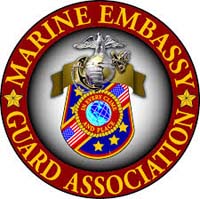 I'm currently a regular member of the Marine Embassy Guard Association (MEGA). Some of the best features of the membership are specific web pages dedicated for each MSG detachment whereby annotated pictures and a chronological roster of MSGs assigned to the Mission are maintained. There are also annual reunions held throughout the U.S. I'm currently a regular member of the Marine Embassy Guard Association (MEGA). Some of the best features of the membership are specific web pages dedicated for each MSG detachment whereby annotated pictures and a chronological roster of MSGs assigned to the Mission are maintained. There are also annual reunions held throughout the U.S.
IN WHAT WAYS HAS SERVING IN THE MILITARY INFLUENCED THE WAY YOU HAVE APPROACHED YOUR LIFE AND YOUR CAREER?
Military service has enabled me to temper the anger and resentment that built up during my teenage years and helped me learn to be patient and fair when dealing with other people.
It also taught me how to be an effective leader who can be flexible or firm as the situation requires, plus be resourceful and innovative despite the lack of resources, short-fuse notices, or dire circumstances.
These are traits and values that have favorably shaped my persona throughout my adult life in both the military service and as a civilian.
BASED ON YOUR OWN EXPERIENCES, WHAT ADVICE WOULD YOU GIVE TO THOSE WHO HAVE RECENTLY JOINED THE MARINE CORPS?
While in boot camp, a new recruit should do everything the D.I. directs as quickly and correctly as possible, with no unnecessary verbal interaction. It's best to maintain a low profile in boot camp and not draw attention to yourself by doing such things as goofing off, being the last person to accomplish a task, screwing up in drill and manual-of-arms, talking in formation, having a sloppy appearance, neglecting hygiene such as skipping showering or not brushing your teeth, forgetting to shave, and NEVER, EVER leave your weapon in an unsafe position or let it get rusty. in boot camp, a new recruit should do everything the D.I. directs as quickly and correctly as possible, with no unnecessary verbal interaction. It's best to maintain a low profile in boot camp and not draw attention to yourself by doing such things as goofing off, being the last person to accomplish a task, screwing up in drill and manual-of-arms, talking in formation, having a sloppy appearance, neglecting hygiene such as skipping showering or not brushing your teeth, forgetting to shave, and NEVER, EVER leave your weapon in an unsafe position or let it get rusty.
After you graduate from boot camp you can relearn how to act normal, but until that day just keep your mouth shut and do everything you're told as fast as you can. Even though boot camp may seem like an eternity while you're experiencing it, the three months it consists of will eventually pass and your graduation from it will earn your membership in the annals of Marine Corps history.
IN WHAT WAYS HAS TOGETHERWESERVED.COM HELPED YOU REMEMBER YOUR MILITARY SERVICE AND THE FRIENDS YOU SERVED WITH.
TWS provides a very thorough and flexible format for recording the wide variety of experiences that Marines accumulate during their service in the Corps. I've found that I am able to transcribe my individual adventures and observations that were significant to me and which probably no one else remembers they occurred. I especially like the ability to update my TWS profile whenever I've recalled something that I have not previously recorded. 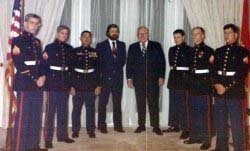 I think a TWS profile that's robustly filled-out provides a microcosm of Marine Corps history that is rarely described in history books. I think a TWS profile that's robustly filled-out provides a microcosm of Marine Corps history that is rarely described in history books.
So far, I've made contact with six Marine brothers that I haven't seen in decades. I've also found the profiles of several other guys I knew in the past, but they haven't responded to my emails yet. I guess they either have not checked their TWS email account lately or they do not remember me (or maybe they DO remember me and that's why they're not replying). Anyway, it has amazed me how many of them made a career in the Corps and retired with such distinguished records of service.
|
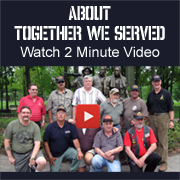


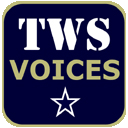
Read Other Interviews in the TWS Voices Archive
| Share this Voices on:


  |
|
TWS VOICES
TWS Voices are the personal stories of men and women who served in the US Military and convey how serving their Country has made a positive impact on their lives. If you would like to participate in a future edition of Voices, or know someone who might be interested, please contact TWS Voices HERE.
This edition of Marines Voices was supported by:
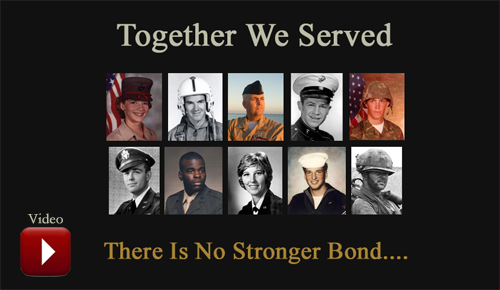
Marines.Togetherweserved.com
Semper Fidelis - Always Faithful. It's more than a motto. It's a way of life. TogetherWeServed.com is a unique, feature-rich resource helping Marines stay faithful to the Brotherhood of the Corps. This is a place where Marines can re-connect with lost Brothers, share memories and tell their Marine story.
To join Marines.Togetherweserved.com, please click HERE.
| |